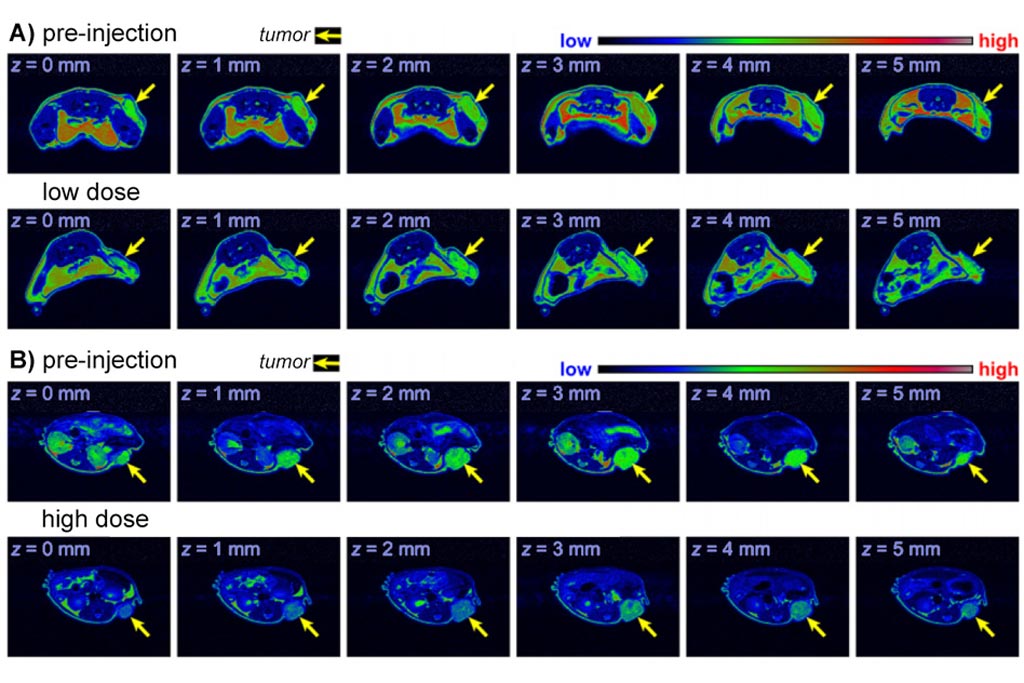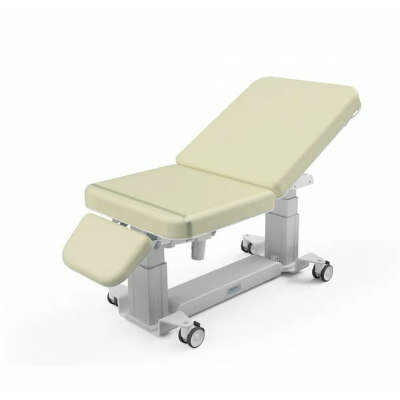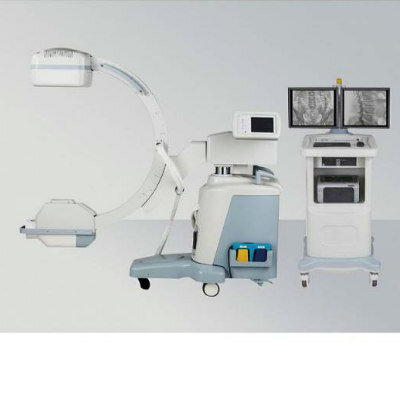New Metal-free Contrast Agent May Be Safer for Patients
|
By MedImaging International staff writers Posted on 25 Jul 2017 |

Image: Researchers have developed a safer hydroxide organic MRI contrast agent, as an alternative to metal based ones, for young children and other high-risk patients (Photo courtesy of MIT / University of Nebraska).
Researchers have developed a new metal-free MRI contrast agent that could be used for high-risk patient groups and make longer-term tumor imaging more feasible.
Magnetic Resonance Imaging (MRI) tumor imaging scans are often used together with intravenous contrast agents, most commonly gadolinium-based ones. These agents contain metal compounds that can be harmful for patients with kidney problems, and for young children.
Now researchers at the Massachusetts Institute of Technology (MIT; Boston, MA, USA), and the University of Nebraska (Lincoln, NB, USA) have developed an organic nitroxide-based metal-free contrast agent that is safer for these high-risk groups. The new agent also accumulates for longer at a tumor site providing more data for MRI scans.
The researchers loaded the nitroxide agent into a spherical Brush-Arm Star Polymer (BASP) structure with a hydrophilic core and a hydrophobic shell. They also found that they could substantially increase the MRI relaxivity of the agent, to around the level of metal-based agents. The BASP shell protects the radicals in the bloodstream allowing them to survive for up to 20 hours.
The new contrast agent could also be modified to carry drugs, in addition to the MRI contrast agent, and allow for long-term imaging and follow-up treatments to monitor whether the drug is able to shrink the tumor. Another possibility under investigation is combining the contrast agent particles with antibodies that can target specific cells.
Senior author of the study, associate professor of Chemistry at MIT, Jeremiah Johnson, said, “This is an entirely organic, metal-free MRI contrast agent that would allow cancer researchers to start to think about how to image tumors in a dynamic way over long periods of time.
Related Links:
Massachusetts Institute of Technology
University of Nebraska
Magnetic Resonance Imaging (MRI) tumor imaging scans are often used together with intravenous contrast agents, most commonly gadolinium-based ones. These agents contain metal compounds that can be harmful for patients with kidney problems, and for young children.
Now researchers at the Massachusetts Institute of Technology (MIT; Boston, MA, USA), and the University of Nebraska (Lincoln, NB, USA) have developed an organic nitroxide-based metal-free contrast agent that is safer for these high-risk groups. The new agent also accumulates for longer at a tumor site providing more data for MRI scans.
The researchers loaded the nitroxide agent into a spherical Brush-Arm Star Polymer (BASP) structure with a hydrophilic core and a hydrophobic shell. They also found that they could substantially increase the MRI relaxivity of the agent, to around the level of metal-based agents. The BASP shell protects the radicals in the bloodstream allowing them to survive for up to 20 hours.
The new contrast agent could also be modified to carry drugs, in addition to the MRI contrast agent, and allow for long-term imaging and follow-up treatments to monitor whether the drug is able to shrink the tumor. Another possibility under investigation is combining the contrast agent particles with antibodies that can target specific cells.
Senior author of the study, associate professor of Chemistry at MIT, Jeremiah Johnson, said, “This is an entirely organic, metal-free MRI contrast agent that would allow cancer researchers to start to think about how to image tumors in a dynamic way over long periods of time.
Related Links:
Massachusetts Institute of Technology
University of Nebraska
Latest MRI News
- World's First Sensor Detects Errors in MRI Scans Using Laser Light and Gas
- Diamond Dust Could Offer New Contrast Agent Option for Future MRI Scans
- Combining MRI with PSA Testing Improves Clinical Outcomes for Prostate Cancer Patients
- PET/MRI Improves Diagnostic Accuracy for Prostate Cancer Patients
- Next Generation MR-Guided Focused Ultrasound Ushers In Future of Incisionless Neurosurgery
- Two-Part MRI Scan Detects Prostate Cancer More Quickly without Compromising Diagnostic Quality
- World’s Most Powerful MRI Machine Images Living Brain with Unrivaled Clarity
- New Whole-Body Imaging Technology Makes It Possible to View Inflammation on MRI Scan
- Combining Prostate MRI with Blood Test Can Avoid Unnecessary Prostate Biopsies
- New Treatment Combines MRI and Ultrasound to Control Prostate Cancer without Serious Side Effects
- MRI Improves Diagnosis and Treatment of Prostate Cancer
- Combined PET-MRI Scan Improves Treatment for Early Breast Cancer Patients
- 4D MRI Could Improve Clinical Assessment of Heart Blood Flow Abnormalities
- MRI-Guided Focused Ultrasound Therapy Shows Promise in Treating Prostate Cancer
- AI-Based MRI Tool Outperforms Current Brain Tumor Diagnosis Methods
- DW-MRI Lights up Small Ovarian Lesions like Light Bulbs
Channels
Radiography
view channel
Novel Breast Imaging System Proves As Effective As Mammography
Breast cancer remains the most frequently diagnosed cancer among women. It is projected that one in eight women will be diagnosed with breast cancer during her lifetime, and one in 42 women who turn 50... Read more
AI Assistance Improves Breast-Cancer Screening by Reducing False Positives
Radiologists typically detect one case of cancer for every 200 mammograms reviewed. However, these evaluations often result in false positives, leading to unnecessary patient recalls for additional testing,... Read moreUltrasound
view channel
Largest Model Trained On Echocardiography Images Assesses Heart Structure and Function
Foundation models represent an exciting frontier in generative artificial intelligence (AI), yet many lack the specialized medical data needed to make them applicable in healthcare settings.... Read more.jpg)
Groundbreaking Technology Enables Precise, Automatic Measurement of Peripheral Blood Vessels
The current standard of care of using angiographic information is often inadequate for accurately assessing vessel size in the estimated 20 million people in the U.S. who suffer from peripheral vascular disease.... Read more
Deep Learning Advances Super-Resolution Ultrasound Imaging
Ultrasound localization microscopy (ULM) is an advanced imaging technique that offers high-resolution visualization of microvascular structures. It employs microbubbles, FDA-approved contrast agents, injected... Read more
Novel Ultrasound-Launched Targeted Nanoparticle Eliminates Biofilm and Bacterial Infection
Biofilms, formed by bacteria aggregating into dense communities for protection against harsh environmental conditions, are a significant contributor to various infectious diseases. Biofilms frequently... Read moreNuclear Medicine
view channel
New Imaging Technique Monitors Inflammation Disorders without Radiation Exposure
Imaging inflammation using traditional radiological techniques presents significant challenges, including radiation exposure, poor image quality, high costs, and invasive procedures. Now, new contrast... Read more
New SPECT/CT Technique Could Change Imaging Practices and Increase Patient Access
The development of lead-212 (212Pb)-PSMA–based targeted alpha therapy (TAT) is garnering significant interest in treating patients with metastatic castration-resistant prostate cancer. The imaging of 212Pb,... Read moreNew Radiotheranostic System Detects and Treats Ovarian Cancer Noninvasively
Ovarian cancer is the most lethal gynecological cancer, with less than a 30% five-year survival rate for those diagnosed in late stages. Despite surgery and platinum-based chemotherapy being the standard... Read more
AI System Automatically and Reliably Detects Cardiac Amyloidosis Using Scintigraphy Imaging
Cardiac amyloidosis, a condition characterized by the buildup of abnormal protein deposits (amyloids) in the heart muscle, severely affects heart function and can lead to heart failure or death without... Read moreGeneral/Advanced Imaging
view channel
PET Scans Reveal Hidden Inflammation in Multiple Sclerosis Patients
A key challenge for clinicians treating patients with multiple sclerosis (MS) is that after a certain amount of time, they continue to worsen even though their MRIs show no change. A new study has now... Read more
Artificial Intelligence Evaluates Cardiovascular Risk from CT Scans
Chest computed tomography (CT) is a common diagnostic tool, with approximately 15 million scans conducted each year in the United States, though many are underutilized or not fully explored.... Read more
New AI Method Captures Uncertainty in Medical Images
In the field of biomedicine, segmentation is the process of annotating pixels from an important structure in medical images, such as organs or cells. Artificial Intelligence (AI) models are utilized to... Read more.jpg)
CT Coronary Angiography Reduces Need for Invasive Tests to Diagnose Coronary Artery Disease
Coronary artery disease (CAD), one of the leading causes of death worldwide, involves the narrowing of coronary arteries due to atherosclerosis, resulting in insufficient blood flow to the heart muscle.... Read moreImaging IT
view channel
New Google Cloud Medical Imaging Suite Makes Imaging Healthcare Data More Accessible
Medical imaging is a critical tool used to diagnose patients, and there are billions of medical images scanned globally each year. Imaging data accounts for about 90% of all healthcare data1 and, until... Read more
Global AI in Medical Diagnostics Market to Be Driven by Demand for Image Recognition in Radiology
The global artificial intelligence (AI) in medical diagnostics market is expanding with early disease detection being one of its key applications and image recognition becoming a compelling consumer proposition... Read moreIndustry News
view channel
Bayer and Google Partner on New AI Product for Radiologists
Medical imaging data comprises around 90% of all healthcare data, and it is a highly complex and rich clinical data modality and serves as a vital tool for diagnosing patients. Each year, billions of medical... Read more

















